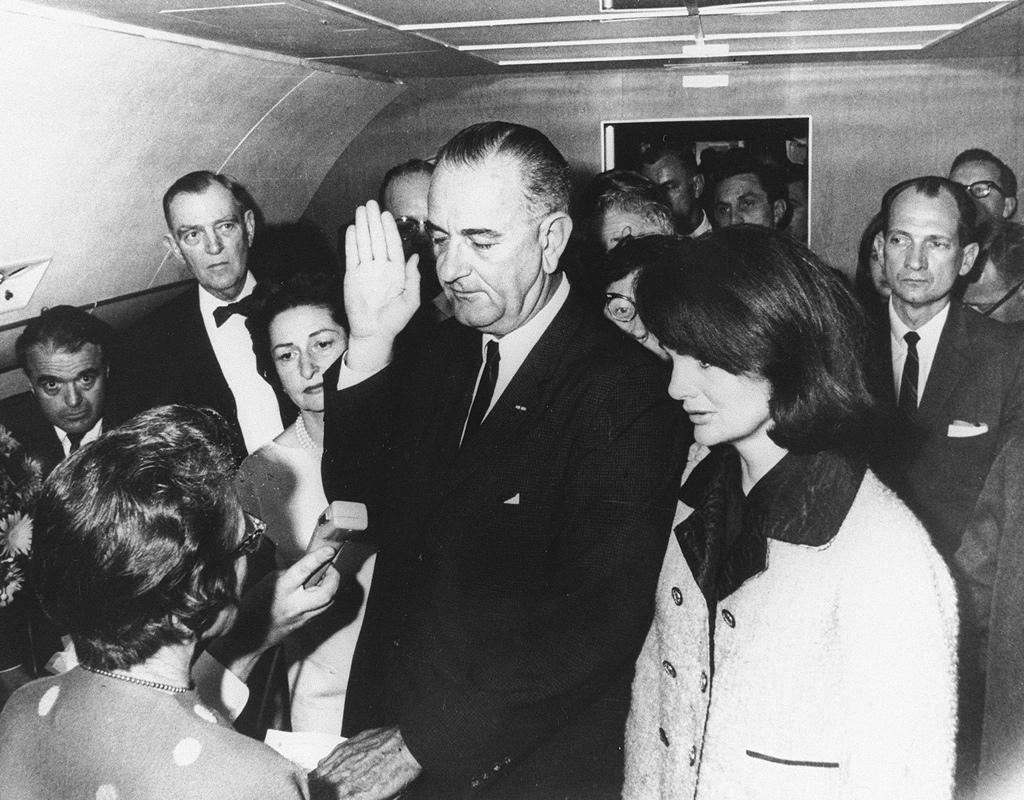For a brief moment on Nov. 22, the White House became a backwater
Flanked by Jacqueline Kennedy, right, and his wife Lady Bird Johnson, second left, Lyndon Johnson takes the oath of office of president following the assassination of President John F. Kennedy in Dallas, Nov. 22, 1963.
CAMBRIDGE, Mass. — To have been young and in Washington half a century ago was a heady experience. John and Jacqueline Kennedy in the White House had charmed the city as had no other presidential couple in living memory, and the events in Dallas on Nov. 22, 1963, shocked the nation as had no other since the death of Abraham Lincoln a century before.
For many years after, people would remember and recount where they were when JFK was killed. As a young reporter for Time magazine, I had been assigned to interview Averell Harriman at the State Department that morning. Harriman loomed large in Democratic politics. He had served as ambassador to Russia and Britain, and was now a roving ambassador, helpful to Kennedy in Indochina.
The crisis in Laos and the Vietnam War were not as all-absorbing as they would later become, but, for some reason I cannot now remember, Harriman drifted away from Indochina and started talking about Henry Wallace, Franklin Roosevelt’s vice president before Harry Truman.
Harriman said how disastrous it would have been if Wallace, so naive about the Soviet Union, had become president upon Roosevelt’s death. According to Harriman, it had been a near thing, and that he, and some others close to FDR, had argued mightily to have Wallace replaced on the ticket. It is so important to have a vice president who can take over immediately when disaster strikes, he said.
I will never know why Harriman was driven to talk about the vice presidency on that particular day, or what premonitions he might have had. I never saw him again. But when I wandered back to the Time office the news was already coming through that President Kennedy had been shot.
Since those who regularly covered the president were in Dallas, I was told to go over to the White House to see what was going on. There I found staffers milling about, desperate for news, and not knowing what to do because the eyes of the world were now on Texas and the dying president. No one around Kennedy thought to call the president’s staff. For a moment the White House had become a backwater.
Staffers were arguing over whether the White House flag should be lowered. Television was already reporting that the president was dead, but the feeling was that lowering the White House flag would make it official, and no one at the White House had been officially informed.
There was really nothing to report at the White House, so when I heard that Kennedy’s body would be arriving in Washington soon, I went to the hospital in time to see Mrs. Kennedy, still in her blood-spattered dress, climbing the long steps with Bobby Kennedy.
As the official party swept on into the hospital entrance, I looked back and saw that the vehicle carrying the president’s body was left unguarded. For a moment even the driver had disappeared, and it looked as if anyone could have simply gotten in and driven away with the corpse of the dead president. Within moments, however, swarms of people gathered to take the coffin inside.
Time and Life magazines held a much more important place in American journalism 50 years ago than today. Time had to tear up a cover story on the musician Thelonious Monk, and Life had to scrap a cover on Navy football player Roger Staubach. Life re-plated with a black-rimmed photograph of JFK, while Time, clinging to the tradition that it never put dead people on its cover, went with the new president, Lyndon Johnson.
Harriman never did tell me if he thought JFK would withdraw from Vietnam. Kennedy had told plenty of people that he would, but only after he was re-elected. Kennedy did not want to be seen as soft on communism in the upcoming election of 1964. But then Kennedy had also said it was necessary to hang tough and show resolve to the Soviet Union and Vietnam was the place to do it.
Only a couple of weeks before JFK’s assassination, President Ngo Dinh Diem had been assassinated in a Saigon coup, which Kennedy had supported.
Stability was wobbly, and as it turned out, Diem’s death was followed by a series of nondescript generals as the security situation deteriorated. It could easily have been that if Kennedy had been re-elected, he might have delayed pulling out of Vietnam until the security situation improved. Personally, I don’t think Kennedy ever would have committed hundreds of thousands of ground troops, as did his successor, but no one will ever know for sure.
Kennedy didn’t live long enough for us to judge his presidency, but his short, swift arc across the political heavens was bright indeed. And Harriman was not wrong about the importance of the vice presidency.
